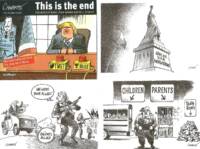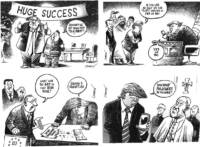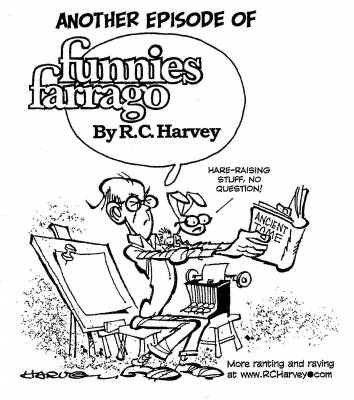“Editoons” — editorial cartoons, the best vehicle for political satire!
IT’S A TOUGH TIME for editorial cartoonists: with the White House occupant being the Clown in Chief, it’s difficult to come up with anything highly comical that he hasn’t already done to excess. But a couple new collections of editorial cartoons (“editoons”) prove ready-and-able.
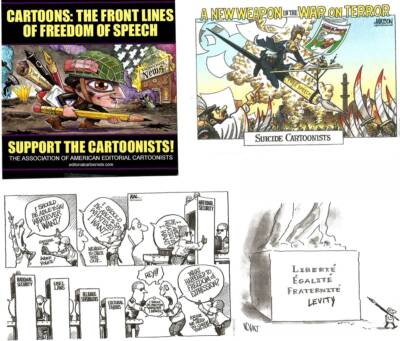
Front Lines: Political Cartooning and the Battle for Free Speech (102 8×8-inch pages, b/w and color; 2019, $15) is now available. Published as a companion to the 2019 Billy Ireland Cartoon Library & Museum exhibit of the same name, the book features lots of cartoons, and essays by Joel Pett, Lucy Caswell, Roslyn Mazer, Rob Rogers and Matt Wuerker. [Joel Pett and Rob Rogers are regulars in the Humor Times monthly magazine! – Ed.]
Editoonist Pett sets the scene early in his Introduction: “Nothing piques my interest like a human with minimal respect for authority, a skewed attitude and jaundiced outlook that they just can’t help sharing, preferably with a healthy does of derision and a dash of artistic flair.” In other words, an editorial cartoonist.
Caswell quickly covers the history of political cartooning in America, and Mazer rehearses the Supreme Court case Hustler v Falwell in which a pornographer’s ridicule of a so-called preacher was allowed to stand in the name of free speech. And Rogers remembers his being fired for doing too many cartoons critical of the Trumpet. Near here, more samples of the hard-hitting content.
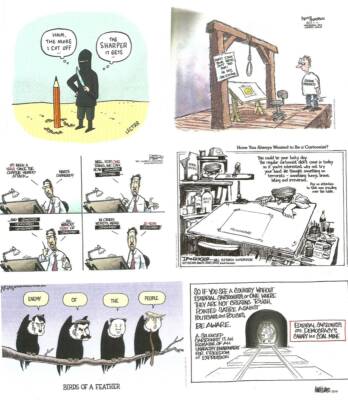 Wuerker writes: “The political cartoonists of today are working in a radically changing media landscape. Our long-held and once secure perch on the traditional daily newspaper is slowly succumbing to the rising sea of digital noise. The business model of newspapers — news printed on newsprint that is paid for by a combination of subscription and advertising — is a thing of the past. Every year we see more and more newspapers sink beneath the waves, taking with them the position of the local editorial cartoonist.
Wuerker writes: “The political cartoonists of today are working in a radically changing media landscape. Our long-held and once secure perch on the traditional daily newspaper is slowly succumbing to the rising sea of digital noise. The business model of newspapers — news printed on newsprint that is paid for by a combination of subscription and advertising — is a thing of the past. Every year we see more and more newspapers sink beneath the waves, taking with them the position of the local editorial cartoonist.
“Economic changes aren’t the only thing making political cartoonists an endangered species. The traditional dynamic of the powerful doing their best to shut down those who ridicule them continues. Cartoonists lucky enough to work in the U.S. are shielded from the good old-fashioned forms of intimidation found in so many countries around the world. Our government doesn’t jail us or send thugs out to intimidate us like they do in places like China, Turkey, Venezuela, Nicaragua and the like. But there are other ways to choke off dissent and constrain pesky cartoonists as well as free speech in general.”
To a person, the editoonists herein make an undeniable case for freedom of speech and press being essential to democracy. That seems so obvious. Why, then, are editoonists a vanishing breed? Their voices are loudest and more pointed, their visual comment understood by even those who cannot read or write. Without their voices, how close are we to letting democracy slip out of our hands?
If you want a copy of this book, it is available only from Wuerker. Send your check for $15 made out to Matt Wuerker to him at 2846 28th Street NW, Washington, D.C. 20008; free shipping & handling. Supplies, they tell me, are limited.
The Trump Years: This Is the End by Patrick Chappette (112 7×10-inch landscape pages, b/w; 2020 Globe Cartoon, $16.95) is a collection of Chappette’s last cartoons from the New York Times, which, prompted by an editorial gaffe with a bad taste cartoon (not Chappette’s), decided to avoid all future criticisms by ending altogether its use of cartoons in its international edition. And so Chappette lost his prestigious outlet.
Contents are divided into two chapters — “Trumpland” and “The Rest of the (Trump) World.” The book includes the essay Chappette wrote in June 2019 about the Times’ short-sightedness, “The End of Political Cartoons at the New York Times.”
In his Foreword, Joseph E. Stiglitz (recipient of the Nobel Memorial Prize in Economic Sciences) writes:
“How could the U.S. — a country heralded as the leader of the free world — have chosen a leader who was openly racist, bigoted, and misogynistic with a predilection for authoritarian leaders and a seeming disdain for democratic values and institutions, including a free press? … To many Americans, every day was anguish, and the only salve for our pain was Chappatte’s cartoons.” Nearby is a sample of Chappette.
The book has been described as “a witty, savage, and thought-provoking testimony of a dizzying world,” continuing, “In this era of strongmen, closing borders and selfie narcissists, humor is needed more than ever.” Especially the humor of editoonists like Chappette, who’s been committing editoons on the international stage for 20 years.
- Funnies Farrago Celebrates a Half Century of Doonesbury - June 1, 2022
- Who Really Invented the Comic Character ‘Archie’? - May 7, 2022
- Dick Wright Returns - April 5, 2022

